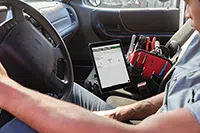Advanced fleet management technology can help HVACR businesses manage the many pressures of handling fleet of vehicles.
HVACR professionals and owners have to be ready for anything while on the job — from helping ensure quick customer communication in the winter when there are heating issues, to helping keep technicians safe on their journeys to and from job sites.
These concerns often play out in how a company invests in technician vehicles, technology and even training that has long term implications on the bottom line.
For instance, while businesses may aim to increase the number of customers reached in a day, they must strike a balance in order to help keep drivers safe while still servicing customers quickly and efficiently.
Advanced fleet management technology can help HVACR businesses manage the many pressures of managing a fleet of vehicles. At its core, fleet management software is a mobile workforce management platform that leverages GPS tracking technology to provide fleet managers visibility and insight into vehicles and asset location with near real-time precision.
In addition to tracking location, it can provide road conditions, monitor unsafe driving behavior and track vehicle maintenance history.
Implementing this technology is one way HVACR fleet managers can prioritize safety and help improve customer satisfaction, while also helping to improve the bottom line. Here are five ways this technology can help.
Improve Efficiency
Service companies are on the lookout for ways to improve productivity, while maintaining high quality work and customer satisfaction. With fleet management technology, route optimization software allows fleet managers to create strategic routes for drivers, which can help decrease the overall number of routes, while increasing the number of customers serviced. This also helps to save on fuel costs and can help balance jobs dispatched across drivers.
Fleet management technology can also help businesses react to and manage unanticipated situations. For example, inclement weather and road closures can have serious implications on the safety of technicians.
Fleet management technology provides weather and traffic overlay information, so managers have the visibility and insight to help drivers navigate new routes and avoid traffic jams or weather-related road closures. This not only helps to protect drivers when they need to concentrate on the road but helps to limit delays during such instances.
Lower Insurance Costs
The data provided by fleet management technology can also be used for insurance purposes. For example, fleet managers can share driver performance and vehicle use reports with insurance companies to negotiate lower rates and discounts. This data illustrates that a company is prioritizing safety and is taking the necessary steps to help prevent future accidents.
Moreover, HVACR businesses can utilize fleet management software in combination with video dash cam technology to help protect against false claims in the event of an accident.
In instances where a driver is accused of being at fault in an accident, owners can use video data for a clearer understanding of what happened. In some cases, companies have leveraged video data to completely overturn incorrect police reports that held a company liable for an accident. Video data is increasingly becoming a company’s first line of defense against costly legal action.
Protect Assets from Theft
GPS tracking can also help reduce vehicle theft and unauthorized vehicle usage, all of which can affect insurance costs. The tracking technology can pinpoint the location of assets and vehicles, and in the case of theft, help authorities recover the stolen property.
While there is no theft-proof solution, leveraging fleet management technology adds an extra layer of defense and can give fleet managers and HVACR business owners additional peace of mind, while also reducing the costs of replacing vehicles or increased insurance.
Reduce Vehicle Maintenance
Making sure vehicles are in working order is an important part of keeping drivers safe, but vehicle maintenance can also become a costly business expenditure. Fleet management technology tracks data from the vehicle’s engine control module and can share service alerts with a fleet manager. These alerts can help extend the life of a vehicle and prevent breakdowns by tracking vehicle health and scheduling maintenance in advance.
In addition, fleet management technology tracks harsh driving behavior at the vehicle level, specifically harsh braking, harsh acceleration, excessive idling, excessive speeding and speeding versus the posted speed limit.
Fleet managers can use the empirical harsh driving data to coach drivers on unsafe behavior, which over time can increase vehicle wear and tear if unchecked. Ultimately, driver coaching paired with data from GPS fleet tracking can help reduce unnecessary repairs.
Improve Customer Satisfaction
A key aspect of business is satisfying clients, so finding ways to improve the customer experience should be top of mind for businesses.
By using GPS tracking, fleet managers can help improve arrival times, enhance driving routes, save time through automation and digital reporting, and track driver location, which all help to deliver better customer results and experiences.
When businesses actively work to improve efficiency, service and results, it can help bring better business results and increase customer referrals.
Overall, fleet management technology provides businesses with the necessary tools to help improve safety, protect assets and increase productivity — from monitoring driver behavior, tracking vehicles and assets with the GPS capabilities, to utilizing route optimization. With these capabilities, HVACR businesses are better equipped to future-proof the business today.
Kevin Aries leads Global Product Success for Verizon Connect, helping build software solutions that optimize the way people, vehicles and things move through the world. Working predominantly with field service businesses, Kevin spends his time understanding the problems and solutions of the service industry to improve customer experience. For additional information, visit verizonconnect.com.



